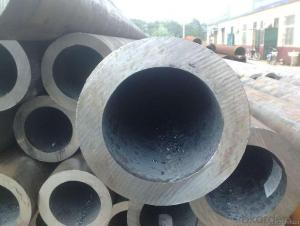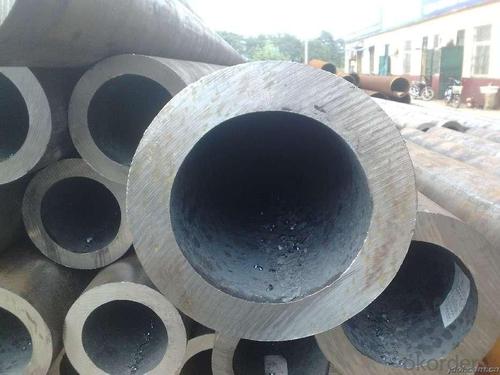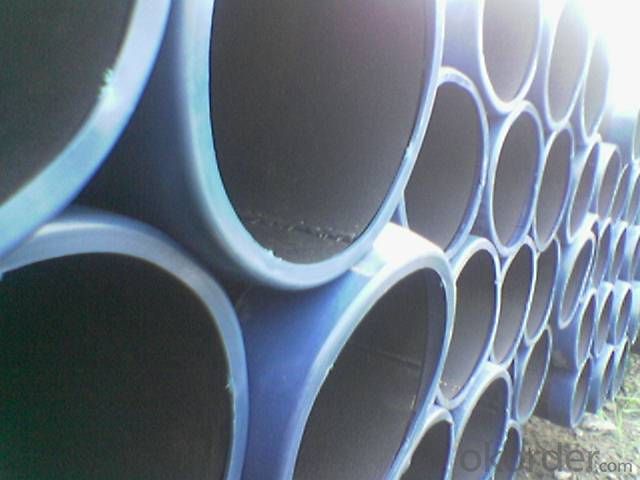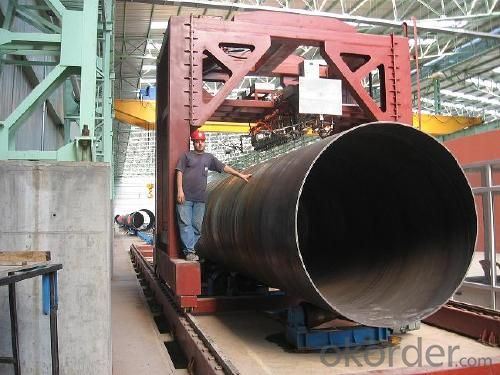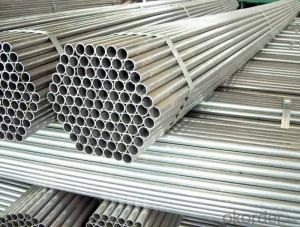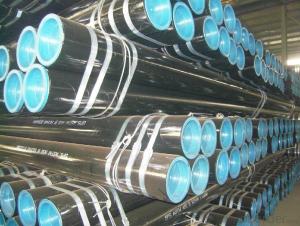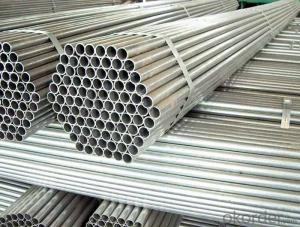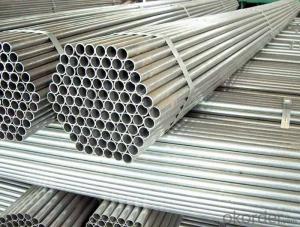Large Diameter Thick Wall Steel Pipe API, ASTM, BS, DIN, GB, JIS
- Loading Port:
- Tianjin
- Payment Terms:
- TT or LC
- Min Order Qty:
- 20 m.t.
- Supply Capability:
- 15000 m.t./month
OKorder Service Pledge
OKorder Financial Service
You Might Also Like
We are company that have many years experience and professional manager team and engineer team and sales team, sure we will provide you high quality of pipe and professioanl service.
Seamless pipe possesses a hollow section and without seam around the strip steel. It is made with solid bar or steel ingot by perforating machine. As the facture process does not include any welding, seamless pipes are considered to be stronger and more durable. Generally speaking, seamless pipe has better pressure resistance and security than other classifications, and was usually more easily available than welded pipe.
2、Main Features of the Seamless Pipe:
• High working accuracy
• High strength
• Small inertia resistance
• Strong therming dissipine ability
• Good appearance
• Reasonble price
3、Seamless Pipe Specification:
Standard | GB, DIN, ASTM ASTM A106-2006, ASTM A53-2007 |
Grade | 10#-45#, 16Mn 10#, 20#, 45#, 16Mn |
Thickness | 8 - 33 mm |
Section Shape | Round |
Outer Diameter | 133 - 219 mm |
Place of Origin | Shandong, China (Mainland) |
Secondary Or Not | Non-secondary |
Application | Hydraulic Pipe |
Technique | Cold Drawn |
Certification | API |
Surface Treatment | factory state or painted black |
Special Pipe | API Pipe |
Alloy Or Not | Non-alloy |
Length | 5-12M |
Outer Diameter | 21.3-610mm |
Grade | 20#, 45#, Q345, API J55, API K55, API L80, API N80, API P110, A53B |
Standard | ASME, ASTM |
1) Material:20#(ASTM A 106/A53 GRB.API5LGRB,GB),45#,16Mn,10#.
2) Specification range: OD: 21.3-610mm, WT:6-70mm, length:6-12m or according to the requirement of clients.
3) Executive standards: GB, ASME API5L.ASTM A 106/A53,Despite of the above standards, we can also supply seamless steel pipe with standard of DIN, JIS, and so on, and also develop new products according to the requirements of our clients!
4) Surface: black lacquered, varnish coating or galvanized.
5) Ends: Beveled or square cut, plastic capped, painted.
6) Packing: bundles wrapped with strong steel strip, seaworthy packing.
4、Packaging & Delivery:
Packaging Details: | seaworthy package, bundles wrapped with strong steel strip |
Delivery Detail: | 15-30days after received 30%TT |
5、FAQ of Seamless Pipe:
①How is the quality of your products?
We have many years business experience in this area, and we have professional engineer and manager team and sure we can provide you high quality production and professional service.
②How about price?
Yes, we are factory and be able to give you lowest price below market one, and we have a policy that “ for saving time and absolutely honest business attitude, we quote as lowest as possible for any customer, and discount can be given according to quantity”,if you like bargain and factory price is not low enough as you think, just don’t waste your time.Please trust the quotation we would give you, it is professional one.
③Why should you chose us?
We can give you both.Additionally, we can also offer professional products inquiry, products knowledge train(for agents), smooth goods delivery, exellent customer solution proposals.Our service formula: good quality+good price+good service=customer’s trust
SGS test is available, customer inspection before shipping is welcome, third party inspection is no problem.
6、Seamless Pipe Images:
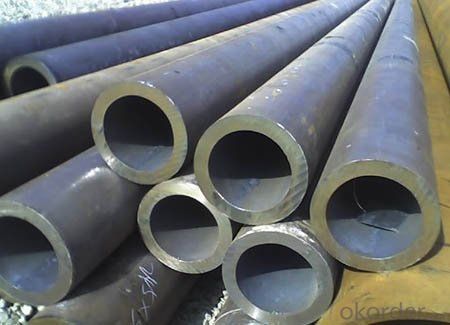
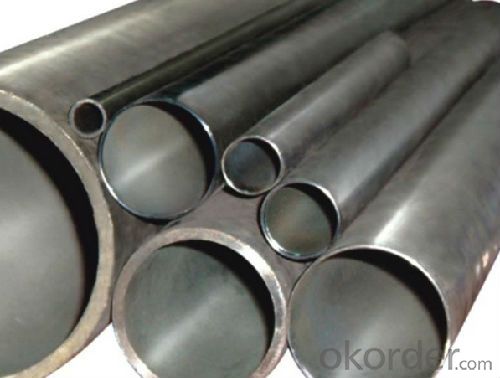
- Q: Seamed steel pipe seamless steel pipe, carbon steel pipe, galvanized pipe, four how to distinguish between
- Seamless steel tube processing technology:1.1 、 hot rolled seamless tubes are usually produced on automatic rolling mills. After checking and cleaning the surface defects, the solid tube is cut into the required length, centring on the end face of the tube blank, then sent to the heating furnace and punched on the piercer. At the same time, the hole rotates and advances continuously. Under the action of the roller and the plug, the inner cavity of the pipe blank is gradually formed, and the cavity is called the capillary. Sent to the automatic tube rolling mill on rolling. Finally, the thickness of the whole machine is the same, and the diameter of the sizing machine is determined to meet the specifications. It is an advanced method to produce seamless steel tube by continuous rolling mill.1.2, in order to obtain smaller size and better quality of seamless tube, cold rolling, cold drawing method must be used or combined. Cold rolling is usually carried out on a two roller mill, where the steel tube is rolled in the annular groove made of variable cross section, round hole groove and stationary conical head. Cold drawing is usually performed in single chain or double chain cold drawn machines from 0.5 to 100T.1.3, the extrusion method will soon heat the tube blank in the closed extrusion cylinder, the perforation bar and extrusion rod movement, so that extrusion parts from the smaller hole extrusion. This method can produce smaller diameter steel pipe.Seamless steel pipe use: mainly used to transport fluid pipeline or structural parts.The main use of steel pipe joints (steel) two welded together, so the price is cheap, widely used.
- Q: How do steel pipes compare to other materials, such as PVC or copper?
- Steel pipes have several advantages over other materials such as PVC or copper. Firstly, steel pipes are incredibly durable and strong, making them suitable for heavy-duty applications and high-pressure environments. Additionally, steel pipes have a longer lifespan compared to PVC or copper, as they are less prone to cracking, corrosion, or degradation. Steel pipes also provide better fire resistance and are more resistant to extreme temperatures. However, steel pipes can be more expensive and require professional installation due to their weight and rigidity. PVC pipes, on the other hand, are lightweight, affordable, and easy to install, but they may not be as durable or suitable for certain applications. Copper pipes offer excellent corrosion resistance and are commonly used for water supply systems, but they can be more expensive and require skilled labor to install. Ultimately, the choice between steel, PVC, or copper pipes depends on the specific requirements of the project and the desired balance of cost, durability, and performance.
- Q: What are the different types of steel pipe coatings for nuclear power plants?
- There are several types of steel pipe coatings used in nuclear power plants, including epoxy coatings, fusion-bonded epoxy (FBE) coatings, and polyethylene (PE) coatings. These coatings provide corrosion and chemical resistance to the steel pipes, ensuring their longevity and safety in the demanding environment of a nuclear power plant.
- Q: Can steel pipes be used for transporting liquids and gases?
- Yes, steel pipes can be used for transporting liquids and gases. Steel pipes are commonly used in various industries, such as oil and gas, water supply, and chemical processing, due to their durability, strength, and resistance to corrosion. They are capable of safely and efficiently transporting a wide range of liquids and gases over long distances.
- Q: What is a valve and how is it used in steel pipes?
- A valve is a device used to control the flow of fluid or gas within a system. In steel pipes, valves are used to regulate and control the flow of liquids or gases by opening, closing, or partially obstructing the passage within the pipe. They are essential for redirecting or stopping the flow, ensuring the safe and efficient operation of the steel pipe system.
- Q: Can steel pipes be used for conveying potable water?
- Yes, steel pipes can be used for conveying potable water. However, there are some considerations and precautions that need to be taken into account. Steel pipes are strong and durable, making them suitable for transporting water over long distances. They are also resistant to corrosion and can withstand high pressure. To ensure the safety and quality of the water being transported, it is important to use pipes that are specifically designed and manufactured for potable water applications. These pipes are often coated or lined with materials that prevent the leaching of contaminants into the water, such as epoxy or cement mortar lining. Additionally, regular maintenance and inspections should be conducted to prevent the buildup of sediments or rust that could affect the water quality. It is worth noting that steel pipes can be more expensive compared to other materials like plastic or copper. However, their longevity and reliability make them a cost-effective choice in the long run. It is also important to comply with local regulations and standards regarding the use of steel pipes for conveying potable water to ensure the health and safety of consumers.
- Q: How are steel pipes used in the transportation of fluids?
- Steel pipes are commonly used in the transportation of fluids due to their durability, strength, and corrosion resistance. They are used in various industries, including oil and gas, water supply, and chemical processing, to transport liquids and gases over long distances. The seamless construction of steel pipes ensures a smooth flow of fluids, reducing friction and pressure loss. Additionally, their ability to withstand high temperatures and pressures makes them ideal for transporting fluids safely and efficiently.
- Q: What is the difference between steel pipes and concrete-lined pipes?
- The main difference between steel pipes and concrete-lined pipes lies in their composition and protective features. Steel pipes are typically made entirely of steel, providing strength and durability. On the other hand, concrete-lined pipes consist of a steel pipe coated with a layer of concrete. This lining offers additional protection against corrosion and abrasion. While steel pipes are more suitable for high-pressure applications and offer better resistance to external factors, concrete-lined pipes are commonly used in wastewater systems to prevent corrosion and extend the lifespan of the pipe.
- Q: How do steel pipes perform in high-temperature applications?
- Steel pipes perform well in high-temperature applications due to their excellent heat resistance and structural integrity. The high melting point of steel allows it to withstand extreme temperatures without deformation or failure. Additionally, steel pipes have good thermal conductivity, which ensures efficient heat transfer in industrial processes.
- Q: How are steel pipes used in the manufacturing of agricultural machinery and equipment?
- Due to their various advantageous properties, steel pipes have become widely utilized in the production of agricultural machinery and equipment. These pipes are employed in multiple ways to improve the efficiency and durability of such machinery. A primary application of steel pipes in agricultural machinery is their use in constructing frames and chassis. The exceptional strength and structural integrity of steel pipes make them an ideal choice for supporting heavy loads and enduring the demanding conditions often encountered in agricultural operations. Whether it is a tractor, combine harvester, or tillage equipment, steel pipe frames provide the necessary stability and sturdiness required for these machines to function efficiently in the field. Another common use of steel pipes in agricultural machinery is within hydraulic systems. These pipes function as conduits for hydraulic fluids, ensuring the smooth and reliable operation of various components, such as hydraulic cylinders, pumps, and motors. Thanks to their corrosion resistance and ability to withstand high pressure, steel pipes contribute to the longevity of hydraulic systems, reducing maintenance and repair costs for agricultural machinery. Moreover, steel pipes find application in the exhaust systems of agricultural equipment. To minimize environmental impact and maintain engine performance, it is essential to safely and efficiently expel the exhaust gases produced by engines. Steel pipes with suitable thickness and thermal resistance are employed in constructing exhaust systems, enabling the effective removal of exhaust gases while reducing noise pollution. Additionally, steel pipes are utilized in the manufacturing of irrigation systems and equipment used in agriculture. Whether it involves transporting water from a source to the fields or distributing water to crops through sprinklers or drip irrigation, steel pipes provide the necessary durability and pressure resistance for efficient water delivery while minimizing leaks. In conclusion, the incorporation of steel pipes in the manufacturing of agricultural machinery and equipment plays a vital role in enhancing their performance, durability, and efficiency. The exceptional strength, structural integrity, corrosion resistance, and high pressure capabilities of steel pipes make them indispensable components in various applications within the agricultural sector.
Send your message to us
Large Diameter Thick Wall Steel Pipe API, ASTM, BS, DIN, GB, JIS
- Loading Port:
- Tianjin
- Payment Terms:
- TT or LC
- Min Order Qty:
- 20 m.t.
- Supply Capability:
- 15000 m.t./month
OKorder Service Pledge
OKorder Financial Service
Similar products
Hot products
Hot Searches
Related keywords
